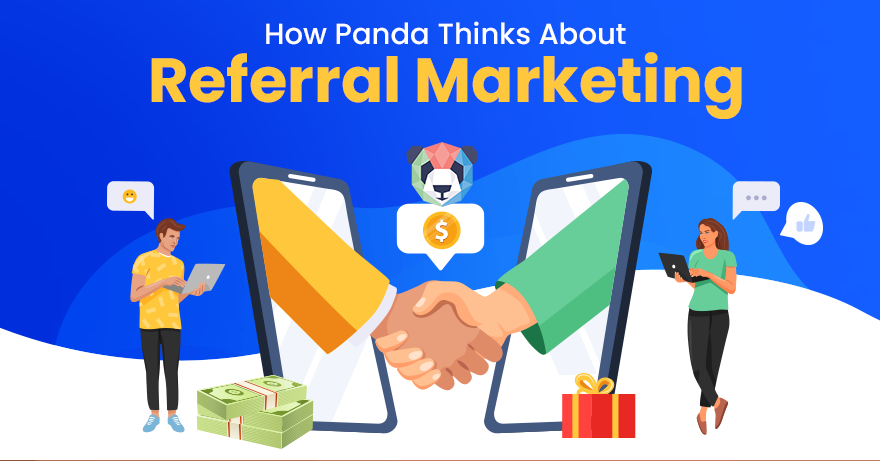
Panda Trading Systems Newsletter. November 2023
November 12, 2023
Why Apps Matter: Fueling Growth in Online Trading
December 3, 2023
Here at Panda, we’ve been singing the praises of referral programs for years. Not only are they a very capital efficient way of converting new clients, they also incentivise existing clients who are happy with your service to spread the word.
While a referral strategy can start out as a supplement to your existing marketing efforts, done right it can turn into a completely independent stream of conversions. This is because referral programs take on a life of their own when the following criteria are met:
- You have a solid product or service to offer
- You have happy customers willing to spread the word
- You make it both worth their while and simple to do so
- Those referrals also become happy customers willing to spread the word
The Power of Word of Mouth
Word of mouth remains one of the oldest and strongest forms of advertising, especially when that word-of-mouth is coming from people we know. According to Nielsen, this kind of advertising is actually 4 times more likely to convert.
It’s a very powerful effect. So much so, that in the absence of a solid referral program it’s often impossible for marketing managers to filter it out when trying to track the success of their other campaigns. This is because a good part of those conversions are also likely to have some kind of word-of-mouth component.
According to Google, 74% of consumers state that word-of-mouth is a key factor influencing their purchasing decisions. If you consider your own purchasing habits for a moment, this probably also holds true for you, with your most trusted associates possibly having the strongest influence over your consumer decisions.
Referrals Become Referrers
What successful referral programs do is to create a separate funnel for this activity by explicitly incentivising it. And you can judge the success of a referral program by whether downstream of those referrals your referred clients go on to refer others in their own networks.
According to Extole, referred clients are 5 times more likely to join your referral program and go on to refer others. So, assuming that they’re happy with your services and incentivised by your referral rewards, they are actually more likely than your existing clients to become referrers. After all, this was precisely what brought them in in the first place!
A Client Referred is a Client Retained
But it goes further than that. There’s data to suggest that the retention characteristics of clients converted via referral programs are more favourable than those converted through other marketing efforts.
According to a Harvard Business Review study, referred customers are 18% more likely to be retained. The specific study, which focused on 10,000 customer accounts of a large German bank over the course of 3 years, also found that those referred customers were 16% more profitable for the bank.
With CPA’s being what they are in our industry, it’s becoming clear to many brokers that referral programs are cheaper than acquiring new customers through other means. The fact that the cost of that acquisition goes directly to the customer themselves sets up a dynamic where that activity can be self-perpetuating. Happy customers recruit more happy customers.
Panda’s Referral Experience
With all this in mind, at Panda we’re keen on encouraging our customers to develop their own referral strategies. Our products are always geared towards achieving more with fewer resources, so this functionality was important for us to include. Panda CRM comes bundled with a Refer-a-Friend module that empowers brokers using our software to easily run their own referral strategies, effectively leveraging the power of word-of-mouth in their own operations.
But we also practice what we preach, Panda Trading Systems also runs its own successful referral program as a technology provider. In our case, we offer up to $5000 per referral as soon as the deal is done, but we also encourage repeat referrals by offering bonuses to parties that regularly send customers in our direction. The logic is exactly the same as the 4 points we opened with, regardless of whether the focus is on B2B rather than B2C.
- As a company we have many innovative products and services to offer
- Our customers tend to become loyal partners over time when they see what our software achieves for their businesses
- We have managed to spread the word that Panda values referrals highly and is reliable and trustworthy in its payments
- Referred clients don’t have to be “sold” on either the product or the referral program itself because they have already experienced and are happy with both
Obviously there are differences between B2B and B2C. In our experience, it’s easier to spread the word of a solid referral program in a B2B setting because it’s a smaller community. And you also have to consider that the industry still maintains a very strong face-to-face element with all the expos and other events that are a regular part of the online FX calendar.
Final Thoughts
The point is that a good referral program sells itself if the incentives are correct. And it only works if it’s genuinely satisfied customers who are engaging in the program. This is because referrals are founded on spreading the word about a good thing. If what you’re selling genuinely is a good thing, then those new customers will inevitably go on to bring further new customers.
So, to sum up: Get the service right to start with, get the incentives right, and make it effortless to become a referrer.
For free consultation
Request a Call
